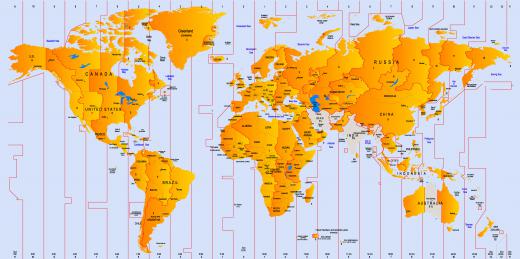What is a Zeitgeber?
 Mary McMahon
Mary McMahon
A zeitgeber is an external cue which influences the operations of the internal clock in an organism. The classical example of a zeitgeber is light, which leads some organisms to wake up, while others go to sleep. An interruption in such cues can confuse an organism, potentially causing health problems and functional difficulties, as demonstrated in numerous studies.
The term was coined in 1954 by Jürgen Aschoff, a German biologist who studied circadian rhythms. In German, “zeitgeber” means “time giver,” so in a sense, you could consider a zeitgeber to be like a natural alarm clock, triggering some sort of change in an organism's internal clock, like a cue to wake up, eat, or engage in various activities.

Light is such a powerful zeitgeber that numerous studies have been carried out on the influences of light over the lives of various organisms. Deprivation of light clearly has an influence on health, as does an excess of light, and many people struggle when they travel across time zones because they receive external cues to wake up or go to sleep at times which feel strange to the body.

Other natural and unnatural phenomena can act as zeitgebers. Many social interactions, for example, can provide cues to the internal clock, as can eating, drinking, using various medications, and taking drugs. In some instances, the body learns to respond to particular events, following patterns established in the past, and in other cases, the body can be tricked into responding, as is sometimes done with prescription medications.
In many cases, a zeitgeber is a naturally occurring cue, and it is part of a complex series of cues used to establish natural rhythms for an organism. For example, people who live with chickens often use roosters as a cue to get up, naturally rising earlier or later in the day throughout the year as roosters crow at different times, depending on when the sunrise is. Roosters actually crow before the sunrise, typically, which may come as a surprise to some people, and the birds have an uncanny ability to recognize the time of sunrise, tending to be very reliable clocks.
Because the internal clock relies on zeitgebers to set itself, a lack of such cues can be very disorienting, which explains why people have trouble sleeping in strange places, or experience a disruption of appetite or personality while traveling. Many such cues are so subtle that people don't realize how influential they are until they are gone.
AS FEATURED ON:
AS FEATURED ON:












Discussion Comments
Can you actually use your computer as a zeitgeber?
@TreeMan - There are a lot of potential reasons you're having sleeping problems. I had a similar problem a while back.
Some of the first things to look for are whether there is anything new you started doing that might have caused you to get out of your rhythm. Are you under a lot of stress? Just changing the position of your bed or getting new pillows can trigger zeitgeber problems with some people. It's along the same lines as sleeping in a hotel.
What I would recommend, and what finally helped me get my clock back in sync was to make sure I didn't watch TV or get on the computer at least an hour before bed since these things can excite the brain. Don't drink caffeine during the day. Finally, read or do something relaxing for the hour before you go to bed. Most importantly: don't take naps! This will completely ruin your system. Good luck!
I have been having a ton of problems with my biological rhythms lately. I don't know what has happened, but I have been having a lot of sleeping problems the last couple of months.
Before, I was pretty regular about when I went to sleep and got up. I never really had any problems. For some reason, that all changed, and now when I go to sleep, it takes me a couple hours to go to sleep sometimes, and when I wake up in the morning I am always still tired.
Since I'm not getting all the sleep I need, I start feeling tired earlier in the day, too. This might cause me to accidentally take a nap later on, which just compounds the problem.
Does anybody have any ideas why my internal clock might have gotten messed up, and what should I do to try to fix it?
At least for me, eating is probably my biggest zeitgeber. I always think it is interesting that every day I start to get hungry right around noon and 6 in the evening. Even if I have eaten a snack soon before my normal lunch time, I still feel hungry.
Are the signals that describe a zeitgeber physical in some way, or are they purely mental? When my body starts to feel hungry at meal times, is it because my stomach starts to produce gastric juices like it has every day for weeks before, or does my brain just start telling me that it is time to eat and then I feel hungry?
I read something a while ago that looking at a computer screen at night can have interesting effects on your circadian clock.
Since the light that comes from a computer screen is mostly white light like the light that comes from the sun, it can stop some people from going to sleep when they need to.
I have seen a few programs that are able to change the type of light that comes from your computer screen to more blues. I'm not sure whether it really works or if it is just an idea at this point.
Personally, I don't think I have ever noticed a problem with sleeping after I have been looking at a computer screen for a while, but maybe I am one of the people the article mentions that don't realize the influence since it has been a gradual change.
Post your comments